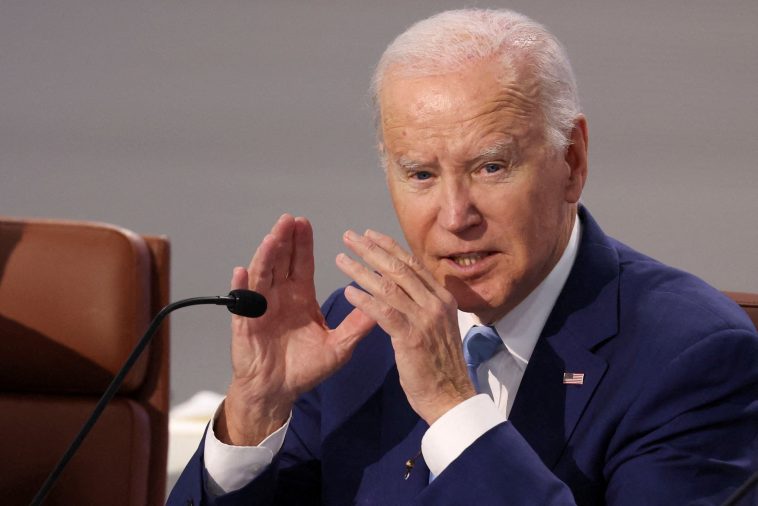Earlier this week, President Biden formally turned down an invitation to participate in a Republican-led impeachment inquiry examining his alleged misconduct. White House counsel Richard Sauber penned a letter to House Oversight Committee Chairman James Comer, a Republican representative from Kentucky, asserting the President’s actions had been entirely above board: ‘Evidence indicates that the President is not at fault, rendering your Committee’s ‘impeachment inquiry’ largely unproductive.’
Sauber continued in the same vein, pointing out that the House should shift its focus toward matters of national interest that deeply concern the American citizens rather than indulging in what he described as a ‘partisan charade’ that squanders both time and taxpayer funds. As to the crux of the matter, Sauber stated, ‘In light of this, President Biden will not be presenting himself before the Committee.’
On a Monday, the White House’s legal team informed the Oversight Committee that the President would not be responding to the impeachment inquiry spearheaded by the Republicans. Comer, the principal of the three House committees steering the impeachment probe, had extended the President an invitation to testify before investigators in the previous month and suggested April 16th as the possible hearing date.
The Chairman, hailing from Kentucky, articulated his concerns in a comprehensive seven-page letter. He raised unsettling questions over the President’s honesty, accusing him of repeatedly skirting around the truth regarding his lack of interaction with his own family’s business partners abroad, both during and immediately after his vice presidency.
Representative Comer’s invitation letter invited the President to a public hearing where he would be given the chance to clarify, under oath, his family’s income sources and the method in which they were obtained. The Chairman’s letter, also pointed out that the impeachment investigation accounted for over $24 million of funds that originated from foreign entities, flowing indirectly towards the President and his family’s business deals.
Despite a mounting pile of evidence to the contrary, President Biden has consistently denied having any involvement in his family’s business endeavors. Yet, it is documented that he met with associates linked to a minimum of two Chinese government-backed enterprises, besides other contacts from Kazakhstan, Mexico, Russia, and Ukraine.
Congressional figures taking part in the investigation assert that President Biden’s son, Hunter, and brother, James, traded on their familial association with the then Vice President to gain entry into countries where US policy was heavily influenced by him during his tenure under President Barack Obama.
In a public statement released after receiving the President’s negatory response, Comer used a familial metaphor to cast aspersions on the character of both the President and his son, ‘It appears the seed hasn’t fallen far from the tree in this case; like Hunter, President Biden is refusing to go on record about the worrisome accusations germinating around the family.’
The Chairman castigated the President for his reticence in addressing queries concerning his relations with business associates of his family. Comer offered this critique, ‘Given the President’s persistent denial of his relationships with his son’s business partners – something his son confirmed under oath – it’s hardly surprising that he is avoiding public scrutiny.’
He further catalogued his disappointment, noting ‘Regrettably, President Biden is refraining from addressing any questions before the public, and refuses straightforward queries we included in our invitation.’ These queries, he maintained, were simple and to the point, questioning why the President’s responses couldn’t be the same.
In his invitation letter, Comer drew attention to ten specific questions he wished the President to answer in writing. These inquiries referred to alleged contacts between the President and various business associates of his son and brother. Additionally, they asked about his knowledge pertaining to the source of using those funds to allegedly repay a loan.
Comer asked the poignant question, ‘What is it that makes it so difficult for the White House to answer these questions?’ He maintained his stance that the American people are deserving of full transparency from their President. He rounded his comments by stating ‘What the American people want are answers from President Biden, not more deceit.’
Comer’s invite extended to the incumbent President was viewed by many political pundits as an almost impossible task, considering its highly ambitious and risky nature, owing mostly to the rarity of such an occurrence in history.
This skepticism stemmed from the historical precedent that no sitting President has voluntarily chosen to testify in-person before Congress since Gerald Ford took to the rostrum back in 1974. Therefore, many saw President Biden’s refusal as just following the status quo.
Indeed, the march of history seemed to be with President Biden in adhering to the precedent set by previous leaders of the nation. This approach, while met with reluctance from some quarters, illustrated yet again the significance of time-honored practices in maintaining a functioning democracy.
While the conservative-led impeachment inquiry continues, it has been met with stark resistance from President Biden who remains steadfast in his refusal to testify, asserting his innocence against allegations of corruption. This stands as yet another episode in the ongoing saga of political discord that veils the nation’s capital in a cloud of uncertainty.



